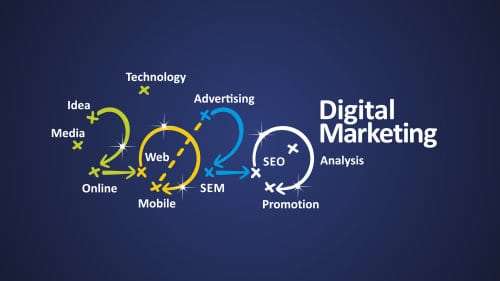digital marketing
The pandemic has drastically changed retail landscape, allowing clients to develop new shopping habit and to lift their brand standards. Digital marketing has also advanced as interactive networks have been built to replace interactions of people and redesign strategies to understand the new reality. However, with the rapid proliferation of emerging technology, behaviours, and patterns, qualified marketers should look into the future even more.
The level of boredom has risen as people are sheltering and many have become entertainment videos for short format: TikTok has become Gen Z’s favourite site, Snapchat’s key redesign has been introduced, and Facebook is releasing Instagram Reels. Since social media use increased for all generations, CMOs have diverted budgets to those platforms – almost 25% of total marketing budgets in the 2nd quarter of 2020, an increase of 13% compared to 2019.

Given that marketers love something quick and attractive, they have to invest in short-range video strategy and implementation to reach younger consumers. TikTok for Business launched earlier this year and is expected to broaden its payroll marketing and publicity opportunities in 2021 – marketers can now begin to research this enigmatic site.
The production of short form videos can seem tricky, but consumer analysis, strategy, and innovation will be key for balancing branded message with the carefree tone of short form videos. Gen Z, on average, takes 8 seconds to begin to try to convey the brand mission, product values and CTA in a quick and snappy way.
The way shoppers are discovering social media brands and products is changing, and we’ll eventually see social shopping on these short-form video platforms becoming more popular. By saying that 30 percent are shopping directly from social media platforms, you can explore innovative ways to integrate social media into your Omnichannel e-commerce strategy.
By 2020, the introduction of the California Consumer Privacy Act (CPA) prompted brands ads on Facebook to unexpectedly refuse to reach millions of shoppers in Calif. The CPA, which limits how businesses can treat shoppers’ personal data in California, represents a growing concern across the entire country for user privacy – 86% of customers worry about their privacy, Baby Boomers and Gen X being the least trustworthy.
The CPA will serve as a blueprint for the enactment of digital privacy laws in the coming year, along with General Data Privacy Regulation. The iOS 14 privacy feature of Apple meanwhile is now postponed to 2021, which will avoid the automated background collection of data for custom ad tracking.
Customers will face significant shifts in how the industry actually monitors, goals and removes them. In other words, sellers have to cast off their old playbooks. Any preparedness can be achieved here:
- Be vigilant about customer privacy and agree to the latest news in the industry by reading.
- Set up a meeting to explore how future changes to privacy can affect your pipeline, with your marketing automation platform members.
- Start communicating the value proposition for consumers to collect information to convince them that their fears about privacy are dealt with.
With the complexity of digital marketing technologies, it is not shocking that marketing automation is a requisite mainstream of the industry. Documents of touchpoints across many devices are so complex and flexible that specialized attribution models could only forecast results and reliably measure ROI. Over time, as a business expands, monitoring these numbers continuously would be almost impossible.
In reality, 67 percent of marketers already use marketing automation software. This is where a marketing automation platform comes in. While software for marketing automation exists for years, new digital capabilities are frequently launched. This technology will grow in 2021, which will allow marketers to turn leads better, generate custom contents and track results. Take it from us: in 2021 and beyond, marketing automation will be the only means for successful digital marketing.
Digital marketing matured in a year full of unparalleled change to fit brands and customers’ new preferences and demands. We are sure to claim that 2021, when the revolutionary use of technologies, marketing strategies and creative ideas is created or broken brands, will be a year of continous digital transformation and dedication. Rise beyond your competitors by planning for these four possible trends—start resource changes, start brainstorms and carry out study.

Digital marketing is a constantly evolving field, and it’s likely that it will continue to be modified in the coming years as new technologies and consumer behavior changes.
Here are a few potential ways digital marketing may be modified in the future:
Artificial Intelligence and Machine Learning: AI and machine learning will play a significant role in digital marketing. AI-powered chatbots will become more prevalent in customer service, and machine learning algorithms will be used to personalize marketing messages based on customer behavior and preferences.
Voice Search Optimization: With the growing popularity of voice assistants like Amazon’s Alexa, Google Assistant, and Apple’s Siri, businesses will need to optimize their content for voice search queries.
Augmented Reality and Virtual Reality: AR and VR technologies will become more mainstream, and businesses will use these technologies to create immersive experiences for their customers. For example, a furniture retailer could use AR to allow customers to visualize how a piece of furniture would look in their home before making a purchase.
Influencer Marketing: Influencer marketing will continue to be a popular digital marketing strategy, but businesses will need to be more selective when choosing influencers to work with. Authenticity and transparency will become even more important as consumers become more savvy to sponsored content.
Data Privacy and Security: With increasing concerns over data privacy and security, businesses will need to be more transparent about how they collect and use customer data. Compliance with data protection regulations, such as the GDPR and CCPA, will be essential for businesses operating in the digital space.
Overall, the future of digital marketing will be shaped by technological advancements, changing consumer behavior, and increased emphasis on data privacy and security.
read more: How social media functions in the growth of business in 2023
Personalization at Scale: As AI and machine learning become more prevalent, businesses will be able to personalize marketing messages at scale. This means that each customer will receive content and messaging tailored specifically to their interests, behaviors, and preferences. This will help businesses build stronger relationships with their customers and drive more sales.

Video Marketing: Video content will continue to be a powerful marketing tool, and businesses will need to invest in creating high-quality video content that engages their audience. Live streaming and interactive videos will become even more popular as they allow businesses to connect with their audience in real-time.
Social Commerce: Social media platforms will continue to integrate e-commerce features, allowing customers to make purchases directly from social media platforms. This will create new opportunities for businesses to reach their target audience and drive sales.
Sustainability and Ethical Marketing: As consumers become more environmentally conscious and socially aware, businesses will need to incorporate sustainability and ethical considerations into their marketing strategies. This means promoting sustainable and ethical practices, being transparent about supply chains, and supporting social causes that align with their brand values.
Hyperlocal Marketing: With the rise of hyperlocal search, businesses will need to optimize their content for local search queries. This means creating location-specific content and leveraging tools like Google My Business to improve local search visibility.


